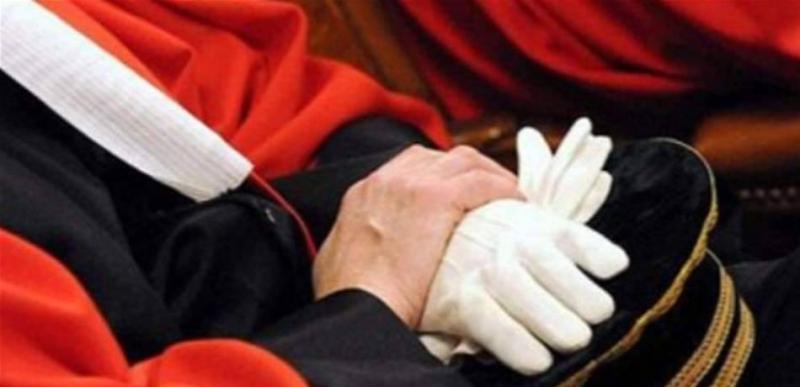Judges in Lebanon have sounded the alarm regarding the social and humanitarian crises they face, which threaten their lives and those of their families, as well as the fate of judicial assistants and the entire Lebanese population. They have announced a general strike, halting work for a full week starting next Monday.
A judicial source informed "Asharq Al-Awsat" that this warning action was initiated "after being informed by the mutual aid fund that they are now obligated to pay 20% of the hospital bill in foreign currency out of their own pockets." This decision "angered judicial authorities, especially since the Supreme Judicial Council is extremely upset with this measure and cannot justify what happened or convince judges to accept it."
Yesterday afternoon, dozens of judges convened in a meeting at the Court of Cassation to discuss developments, issuing a statement saying, "A group of judges met in the 'Martyrs of Justice' hall at the Court of Cassation in Beirut and discussed what the situation has devolved into due to the complete disintegration the country has reached, and the crime of genocide being inflicted on the Lebanese people, including judges and judicial assistants, amid the inability of the vast majority of citizens to secure their daily sustenance."
The judges called on the Lebanese people to "demand that all political leaders who have been in power for decades support the bankrupt and looted Lebanese public treasury with their own funds, out of minimal moral responsibility, as one cannot benefit from the luxury of power while citizens are starving." They also urged all unions and civil society organizations to accompany this demand.
The judges declared their entry into "a complete judicial strike without exceptions, starting from Monday morning (May 30) for a full week, in rejection of the deteriorating judicial dignity on all levels." They appealed to the Supreme Judicial Council, the State Consultative Council, and the Court of Audit to "invite all judges to a general assembly to address the miserable judicial situation."
The judicial source did not hide that this movement "for the first time received the approval of the Supreme Judicial Council and all other judicial bodies." He noted that the organizers of the meeting "anticipated their move by meeting with the President of the Supreme Judicial Council, Judge Suhail Aboud, who appeared extremely upset about the state of the judicial body and the disregard shown by political officials toward this reality."
The judges "are suffering under an unprecedented economic and living burden, especially since the salary of the highest-ranking judge in the republic does not currently exceed 200 U.S. dollars, according to the exchange rate." The source continued: "Judges have endured harsh living conditions and have not abandoned their mission, but they will not tolerate the collapse of their health and family security."
This judicial strike is not the first of its kind, as judges previously stopped working for several weeks in the summer of 2019, demanding the approval of the law for the independence of the judiciary and to remove it from political interventions, although they continued to handle urgent cases and detained files during that time. However, the new movement carries special significance, as austerity measures have begun to disrupt their lives.
The judicial source noted that the crisis has not only exposed judges financially, but also coincides with their deprivation of the right to educate their children, as schools and universities have begun to demand that judges pay their children's tuition fees in fresh dollars, while the state has shirked its responsibility to cover the difference, and the judges' mutual aid fund has failed to improve the situation.
For the first time, the judges' outcry has met with complete acceptance and understanding from judicial authorities, with a source in the Supreme Judicial Council confirming that the situation of judges and judicial assistants has "reached a tragic phase." He explained to "Asharq Al-Awsat" that judges "have become unable to get to their offices and cannot secure gasoline for their cars." He lamented that "courthouses and judges' courts are drowning in darkness, lacking water, cleanliness, and stationery." He emphasized that the council "has long urged judges to endure and sacrifice until people reach their rights, but this will not prevent them from crying out, as they are part of the collapsing Lebanese society."




